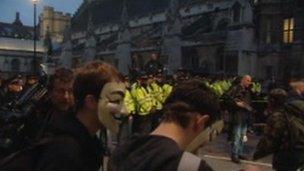Occupy LSX march: Protesters outside Parliament Square
- Published

Scuffles broke out between police and protesters at Parliament Square
About 200 protesters linked to the camp against "corporate greed" outside St Paul's Cathedral have protested in Parliament Square.
Some 1,000 Occupy London Stock Exchange (OLSX) protesters had earlier set off to march on Trafalgar Square, but a breakaway group headed instead for the area outside the Houses of Parliament.
The Met Police said the protest was "illegal" without prior agreement, but OLSX insisted it had consent.
Police said 11 people were arrested.
One was for held criminal damage and the other 10 for unlawful protest, a Met spokesman said.
He said the group had prior arrangement to demonstrate elsewhere but did not have authorisation for the site at Parliament.
In a statement Occupy denied it was an unlawful protest, saying: "Authorisation for a demonstration in Parliament Square was applied for and granted well before the [required] seven-day time limit."
The Met says the protest has now ended.
Police earlier cordoned off Parliament Square to prevent the demonstrators from entering, but several hundred found their way in by going through St James's Park.
There was a confrontation at the top of Whitehall as the group tried to get through a police line, the BBC's Ben Ando reported from the scene.
A line of police at Parliament Square kept the protesters, some wearing the Guy Fawkes masks that have become a symbol of their protest, in an area outside the Houses of Parliament.
They joined a group who had recreated the 1936 Jarrow March for Jobs. Earlier, about 20 young people finished the 330-mile trek from north-east England to London to highlight how Government cuts were "affecting everyone apart from the rich".
On Saturday morning, the former canon chancellor of St Paul's Cathedral - which protesters have been camped outside for three weeks - said the Church of England needed to highlight the human cost of financial injustice.
But the Reverend Dr Giles Fraser, who resigned from his post at the cathedral last month over its handling of the Occupy protest, said he was not sure the Church should get too involved in "proposing specific answers to complex economic problems".
'Financial injustice'
On BBC Radio 4's Thought for the Day, he said: "St Paul's Cathedral is built on a deep theological fault line. On the one hand it's set within the boiler room of global capitalism, and on the other it proclaims a theological story that has some pretty fierce things to say about money and wealth.
"These two powerful tectonic plates, God and mammon, meet right under Wren's magnificent baroque masterpiece.
"It's little wonder that St Paul's can be one of the most challenging and uncomfortable places in which to do theology."
He spoke of "the calling of the Church to draw attention to the human cost of financial injustice".
"This has nothing to do with bringing down capitalism. Markets create wealth and jobs, and indeed those who want to dispense with capitalism are often better at saying what they're against than they are at proposing convincing alternatives.
"Nonetheless, part of the reason why Christianity is so suspicious of money is that the power and glamour of money can easily corral us into a narrower and narrower sense of what it is to be human," he said.
- Published5 November 2011
- Published1 November 2011
- Published5 November 2011
- Published4 November 2011
- Published3 November 2011
- Published3 November 2011
- Published2 November 2011
- Published31 October 2011
- Published27 October 2011
- Published27 October 2011